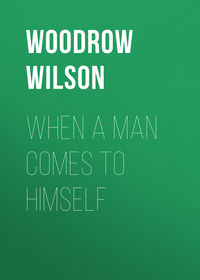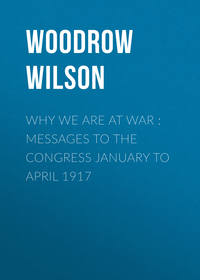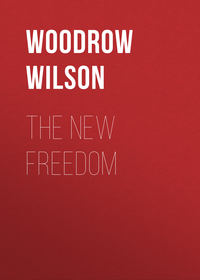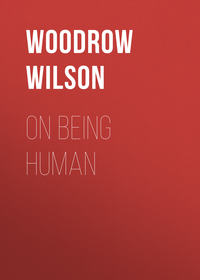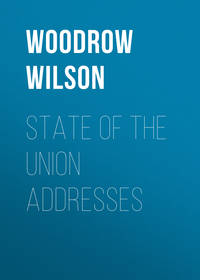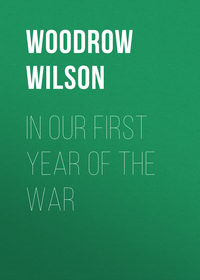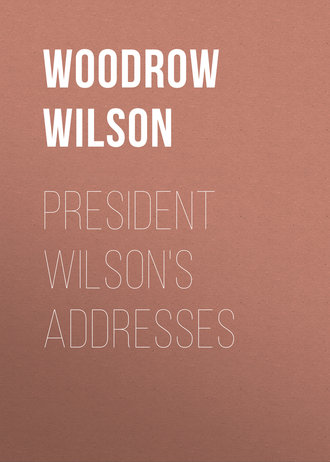 полная версия
полная версияPresident Wilson's Addresses
There is a specific matter about which I, for one, want your advice. Let me say, if I may say it without disrespect, that I do not think you are prepared to give it right away. You will have to make some rather extended inquiries before you are ready to give it. What I am thinking of is competition in foreign markets as between the merchants of different nations.
I speak of the subject with a certain degree of hesitation, because the thing farthest from my thought is taking advantage of nations now disabled from playing their full part in that competition, and seeking a sudden selfish advantage because they are for the time being disabled. Pray believe me that we ought to eliminate all that thought from our minds and consider this matter as if we and the other nations now at war were in the normal circumstances of commerce.
There is a normal circumstance of commerce in which we are apparently at a disadvantage. Our anti-trust laws are thought by some to make it illegal for merchants in the United States to form combinations for the purpose of strengthening themselves in taking advantage of the opportunities of foreign trade. That is a very serious matter for this reason: There are some corporations, and some firms for all I know, whose business is great enough and whose resources are abundant enough to enable them to establish selling agencies in foreign countries; to enable them to extend the long credits which in some cases are necessary in order to keep the trade they desire; to enable them, in other words, to organize their business in foreign territory in a way which the smaller man cannot afford to do. His business has not grown big enough to permit him to establish selling agencies. The export commission merchant, perhaps, taxes him a little too highly to make that an available competitive means of conducting and extending his business.
The question arises, therefore, how are the smaller merchants, how are the younger and weaker corporations going to get a foothold as against the combinations which are permitted and even encouraged by foreign governments in this field of competition? There are governments which, as you know, distinctly encourage the formation of great combinations in each particular field of commerce in order to maintain selling agencies and to extend long credits, and to use and maintain the machinery which is necessary for the extension of business; and American merchants feel that they are at a very considerable disadvantage in contending against that. The matter has been many times brought to my attention, and I have each time suspended judgment. I want to be shown this: I want to be shown how such a combination can be made and conducted in a way which will not close it against the use of everybody who wants to use it. A combination has a tendency to exclude new members. When a group of men get control of a good thing, they do not see any particular point in letting other people into the good thing. What I would like very much to be shown, therefore, is a method of coöperation which is not a method of combination. Not that the two words are mutually exclusive, but we have come to have a special meaning attached to the word "combination." Most of our combinations have a safety lock, and you have to know the combination to get in. I want to know how these coöperative methods can be adopted for the benefit of everybody who wants to use them, and I say frankly if I can be shown that, I am for them. If I cannot be shown that, I am against them. I hasten to add that I hopefully expect I can be shown that.
You, as I have just now intimated, probably cannot show it to me offhand, but by the methods which you have the means of using you certainly ought to be able to throw a vast deal of light on the subject. Because the minute you ask the small merchant, the small banker, the country man, how he looks upon these things and how he thinks they ought to be arranged in order that he can use them, if he is like some of the men in country districts whom I know, he will turn out to have had a good deal of thought upon that subject and to be able to make some very interesting suggestions whose intelligence and comprehensiveness will surprise some city gentlemen who think that only the cities understand the business of the country. As a matter of fact, you do not have time to think in a city. It takes time to think. You can get what you call opinions by contagion in a city and get them very quickly, but you do not always know where the germ came from. And you have no scientific laboratory method by which to determine whether it is a good germ or a bad germ.
There are thinking spaces in this country, and some of the thinking done is very solid thinking indeed, the thinking of the sort of men that we all love best, who think for themselves, who do not see things as they are told to see them, but look at them and see them independently; who, if they are told they are white when they are black, plainly say that they are black—men with eyes and with a courage back of those eyes to tell what they see. The country is full of those men. They have been singularly reticent sometimes, singularly silent, but the country is full of them. And what I rejoice in is that you have called them into the ranks. For your methods are bound to be democratic in spite of you. I do not mean democratic with a big "D," though I have a private conviction that you cannot be democratic with a small "d" long without becoming democratic with a big "D." Still that is just between ourselves. The point is that when we have a consensus of opinion, when we have this common counsel, then the legislative processes of this Government will be infinitely illuminated.
I used to wonder when I was Governor of one of the States of this great country where all the bills came from. Some of them had a very private complexion. I found upon inquiry—it was easy to find—that practically nine-tenths of the bills that were introduced had been handed to the members who introduced them by some constituent of theirs, had been drawn up by some lawyer whom they might or might not know, and were intended to do something that would be beneficial to a particular set of persons. I do not mean, necessarily, beneficial in a way that would be hurtful to the rest; they may have been perfectly honest, but they came out of cubby-holes all over the State. They did not come out of public places where men had got together and compared views. They were not the products of common counsel, but the products of private counsel, a very necessary process if there is no other, but a process which it would be a very happy thing to dispense with if we could get another. And the only other process is the process of common counsel.
Some of the happiest experiences of my life have been like this. We had once when I was president of a university to revise the whole course of study.7 Courses of study are chronically in need of revision. A committee of, I believe, fourteen men was directed by the faculty of the university to report a revised curriculum. Naturally, the men who had the most ideas on the subject were picked out and, naturally, each man came with a very definite notion of the kind of revision he wanted, and one of the first discoveries we made was that no two of us wanted exactly the same revision. I went in there with all my war paint on to get the revision I wanted, and I dare say, though it was perhaps more skillfully concealed, the other men had their war paint on, too. We discussed the matter for six months. The result was a report which no one of us had conceived or foreseen, but with which we were all absolutely satisfied. There was not a man who had not learned in that committee more than he had ever known before about the subject, and who had not willingly revised his prepossessions; who was not proud to be a participant in a genuine piece of common counsel. I have had several experiences of that sort, and it has led me, whenever I confer, to hold my particular opinion provisionally, as my contribution to go into the final result but not to dominate the final result.
That is the ideal of a government like ours, and an interesting thing is that if you only talk about an idea that will not work long enough, everybody will see perfectly plainly that it will not work; whereas, if you do not talk about it, and do not have a great many people talk about it, you are in danger of having the people who handle it think that it will work. Many minds are necessary to compound a workable method of life in a various and populous country; and as I think about the whole thing and picture the purposes, the infinitely difficult and complex purposes which we must conceive and carry out, not only does it minister to my own modesty, I hope, of opinion, but it also fills me with a very great enthusiasm. It is a splendid thing to be part of a great wide-awake Nation. It is a splendid thing to know that your own strength is infinitely multiplied by the strength of other men who love the country as you do. It is a splendid thing to feel that the wholesome blood of a great country can be united in common purposes, and that by frankly looking one another in the face and taking counsel with one another, prejudices will drop away, handsome understandings will arise, a universal spirit of service will be engendered, and that with this increased sense of community of purpose will come a vastly enhanced individual power of achievement; for we will be lifted by the whole mass of which we constitute a part.
Have you never heard a great chorus of trained voices lift the voice of the prima donna as if it soared with easy grace above the whole melodious sound? It does not seem to come from the single throat that produces it. It seems as if it were the perfect accent and crown of the great chorus. So it ought to be with the statesman. So it ought to be with every man who tries to guide the counsels of a great nation. He should feel that his voice is lifted upon the chorus and that it is only the crown of the common theme.
TO NATURALIZED CITIZENS
[Address delivered at Convention Hall, Philadelphia, May 10, 1915. The audience included four thousand newly naturalized citizens. This speech attracted great attention because in it no reference was made to the sinking of the "Lusitania," three days before.]
Mr. Mayor, Fellow-Citizens:
It warms my heart that you should give me such a reception; but it is not of myself that I wish to think to-night, but of those who have just become citizens of the United States.
This is the only country in the world which experiences this constant and repeated rebirth. Other countries depend upon the multiplication of their own native people. This country is constantly drinking strength out of new sources by the voluntary association with it of great bodies of strong men and forward-looking women out of other lands. And so by the gift of the free will of independent people it is being constantly renewed from generation to generation by the same process by which it was originally created. It is as if humanity had determined to see to it that this great Nation, founded for the benefit of humanity, should not lack for the allegiance of the people of the world.
You have just taken an oath of allegiance to the United States. Of allegiance to whom? Of allegiance to no one, unless it be God—certainly not of allegiance to those who temporarily represent this great Government. You have taken an oath of allegiance to a great ideal, to a great body of principles, to a great hope of the human race. You have said, "We are going to America not only to earn a living, not only to seek the things which it was more difficult to obtain where we were born, but to help forward the great enterprises of the human spirit—to let men know that everywhere in the world there are men who will cross strange oceans and go where a speech is spoken which is alien to them if they can but satisfy their quest for what their spirits crave; knowing that whatever the speech there is but one longing and utterance of the human heart, and that is for liberty and justice." And while you bring all countries with you, you come with a purpose of leaving all other countries behind you—bringing what is best of their spirit, but not looking over your shoulders and seeking to perpetuate what you intended to leave behind in them. I certainly would not be one even to suggest that a man cease to love the home of his birth and the nation of his origin—these things are very sacred and ought not to be put out of our hearts—but it is one thing to love the place where you were born and it is another thing to dedicate yourself to the place to which you go. You cannot dedicate yourself to America unless you become in every respect and with every purpose of your will thorough Americans. You cannot become thorough Americans if you think of yourselves in groups. America does not consist of groups. A man who thinks of himself as belonging to a particular national group in America has not yet become an American, and the man who goes among you to trade upon your nationality is no worthy son to live under the Stars and Stripes.
My urgent advice to you would be, not only always to think first of America, but always, also, to think first of humanity. You do not love humanity if you seek to divide humanity into jealous camps. Humanity can be welded together only by love, by sympathy, by justice, not by jealousy and hatred. I am sorry for the man who seeks to make personal capital out of the passions of his fellow-men. He has lost the touch and ideal of America, for America was created to unite mankind by those passions which lift and not by the passions which separate and debase. We came to America, either ourselves or in the persons of our ancestors, to better the ideals of men, to make them see finer things than they had seen before, to get rid of the things that divide and to make sure of the things that unite. It was but an historical accident no doubt that this great country was called the "United States"; yet I am very thankful that it has that word "United" in its title, and the man who seeks to divide man from man, group from group, interest from interest in this great Union is striking at its very heart.
It is a very interesting circumstance to me, in thinking of those of you who have just sworn allegiance to this great Government, that you were drawn across the ocean by some beckoning finger of hope, by some belief, by some vision of a new kind of justice, by some expectation of a better kind of life. No doubt you have been disappointed in some of us. Some of us are very disappointing. No doubt you have found that justice in the United States goes only with a pure heart and a right purpose as it does everywhere else in the world. No doubt what you found here did not seem touched for you, after all, with the complete beauty of the ideal which you had conceived beforehand. But remember this: If we had grown at all poor in the ideal, you brought some of it with you. A man does not go out to seek the thing that is not in him. A man does not hope for the thing that he does not believe in, and if some of us have forgotten what America believed in, you, at any rate, imported in your own hearts a renewal of the belief. That is the reason that I, for one, make you welcome. If I have in any degree forgotten what America was intended for, I will thank God if you will remind me. I was born in America. You dreamed dreams of what America was to be, and I hope you brought the dreams with you. No man that does not see visions will ever realize any high hope or undertake any high enterprise. Just because you brought dreams with you, America is more likely to realize dreams such as you brought. You are enriching us if you came expecting us to be better than we are.
See, my friends, what that means. It means that Americans must have a consciousness different from the consciousness of every other nation in the world. I am not saying this with even the slightest thought of criticism of other nations. You know how it is with a family. A family gets centered on itself if it is not careful and is less interested in the neighbors than it is in its own members. So a nation that is not constantly renewed out of new sources is apt to have the narrowness and prejudice of a family; whereas, America must have this consciousness, that on all sides it touches elbows and touches hearts with all the nations of mankind. The example of America must be a special example. The example of America must be the example not merely of peace because it will not fight, but of peace because peace is the healing and elevating influence of the world and strife is not. There is such a thing as a man being too proud to fight. There is such a thing as a nation being so right that it does not need to convince others by force that it is right.
You have come into this great Nation voluntarily seeking something that we have to give, and all that we have to give is this: We cannot exempt you from work. No man is exempt from work anywhere in the world. We cannot exempt you from the strife and the heartbreaking burden of the struggle of the day—that is common to mankind everywhere; we cannot exempt you from the loads that you must carry. We can only make them light by the spirit in which they are carried. That is the spirit of hope, it is the spirit of liberty, it is the spirit of justice.
When I was asked, therefore, by the Mayor and the committee that accompanied him to come up from Washington to meet this great company of newly admitted citizens, I could not decline the invitation. I ought not to be away from Washington, and yet I feel that it has renewed my spirit as an American to be here. In Washington men tell you so many things every day that are not so, and I like to come and stand in the presence of a great body of my fellow-citizens, whether they have been fellow-citizens a long time or a short time, and drink, as it were, out of the common fountains with them and go back feeling what you have so generously given me—the sense of your support and of the living vitality in your hearts of the great ideals which have made America the hope of the world.
ADDRESS AT MILWAUKEE
[Between January 27 and February 3, 1916, President Wilson made a series of speeches in New York, Pittsburgh, Cleveland, Milwaukee, Chicago, Des Moines, Topeka, Kansas City, and St. Louis. The address made at Milwaukee, on January 31, has been chosen as representing the general tenor and spirit of the whole series.]
Mr. Chairman And Fellow-Citizens:
I need not inquire whether the citizens of Milwaukee and Wisconsin are interested in the subject of my errand. The presence of this great body in this vast hall sufficiently attests your interest, but I want at the outset to remove a misapprehension that I fear may exist in your mind. There is no sudden crisis; nothing new has happened; I am not out upon this errand because of any unexpected situation. I have come to confer with you upon a matter upon which it would, in any circumstances, be necessary for us to confer when all the rest of the world is on fire and our own house is not fireproof. Everywhere the atmosphere of the world is thrilling with the passion of a disturbance such as the world has never seen before, and it is wise, in the words just uttered by your chairman, that we should see that our own house is set in order and that everything is done to make certain that we shall not suffer by the general conflagration.
There were some dangers to which this Nation seemed at the outset of the war to be exposed, which, I think I can say with confidence, are now passed and overcome. America has drawn her blood and her strength out of almost all the nations of the world. It is true of a great many of us that there lies deep in our hearts the recollection of an origin which is not American. We are aware that our roots, our traditions, run back into other national soils. There are songs that stir us; there are some far-away historical recollections which engage our affections and stir our memories. We cannot forget our forbears; we cannot altogether ignore the fact of our essential blood relationship; and at the outset of this war it did look as if there were a division of domestic sentiment which might lead us to some errors of judgment and some errors of action; but I, for one, believe that that danger is passed. I never doubted that the danger was exaggerated, because I had learned long ago, and many of you will corroborate me by your experience, that it is not the men who are doing the talking always who represent the real sentiments of the Nation. I for my part always feel a serene confidence in waiting for the declaration of the principles and sentiments of the men who are not vociferous, do not go about seeking to make trouble, do their own thinking, attend to their own business, and love their own country.
I have at no time supposed that the men whose voices seemed to contain the threat of division amongst us were really uttering the sentiments even of those whom they pretended to represent. I for my part have no jealousy of family sentiment. I have no jealousy of that deep affection which runs back through long lineage. It would be a pity if we forget the fine things that our ancestors have done. But I also know the magic of America; I also know the great principles which thrill men in the singular body politic to which we belong in the United States. I know the impulses which have drawn men to our shores. They have not come idly; they have not come without conscious purpose to be free; they have not come without voluntary desire to unite themselves with the great nation on this side of the sea; and I know that whenever the test comes every man's heart will be first for America. It was principle and affection and ambition and hope that drew men to these shores, and they are not going to forget the errand upon which they came and allow America, the home of their refuge and hope, to suffer by any forgetfulness on their part. And so the trouble makers have shot their bolt, and it has been ineffectual. Some of them have been vociferous; all of them have been exceedingly irresponsible. Talk was cheap, and that was all it cost them. They did not have to do anything. But you will know without my telling you that the man whom for the time being you have charged with the duties of President of the United States must talk with a deep sense of responsibility, and he must remember, above all things else, the fine traditions of his office which some men seem to have forgotten. There is no precedent in American history for any action of aggression on the part of the United States or for any action which might mean that America is seeking to connect herself with the controversies on the other side of the water. Men who seek to provoke us to such action have forgotten the traditions of the United States, but it behooves those with whom you have entrusted office to remember the traditions of the United States and to see to it that the actions of the Government are made to square with those traditions.
But there are other dangers, my fellow-citizens, which are not past and which have not been overcome, and they are dangers which we cannot control. We can control irresponsible talkers amidst ourselves. All we have got to do is to encourage them to hire a hall and their folly will be abundantly advertised by themselves. But we cannot in this simple fashion control the dangers that surround us now and have surrounded us since this titanic struggle on the other side of the water began. I say on the other side of the water; you will ask me, "On the other side of which water," for this great struggle has extended to all quarters of the globe. There is no continent outside, I was about to say, of this Western Hemisphere which is not touched with it, but I recollected as I began the sentence that a part of our own continent was touched with it, because it involves our neighbors to the north in Canada. There is no part of the world, except South America, to which the direct influences of this struggle have not extended, so that now we are completely surrounded by this tremendous disturbance and you must realize what that involves.
Our thoughts are concentrated upon our own affairs and our own relations to the rest of the world, but the thoughts of the men who are engaged in this struggle are concentrated upon the struggle itself, and there is daily and hourly danger that they will feel themselves constrained to do things which are absolutely inconsistent with the rights of the United States. They are not thinking of us. I am not criticising them for not thinking of us. I dare say if I were in their place neither would I think of us. They believe that they are struggling for the lives and honor of their nations, and that if the United States puts its interests in the path of this great struggle, she ought to know beforehand that there is danger of very serious misunderstanding and difficulty. So that the very uncalculating, unpremeditated, one might almost say accidental, course of affairs may touch us to the quick at any moment, and I want you to realize that, standing in the midst of these difficulties, I feel that I am charged with a double duty of the utmost difficulty. In the first place, I know that you are depending upon me to keep this Nation out of the war. So far I have done so, and I pledge you my word that, God helping me, I will if it is possible. But you have laid another duty upon me. You have bidden me to see it that nothing stains or impairs the honor of the United States, and that is a matter not within my control; that depends upon what others do, not upon what the Government of the United States does. Therefore there may at any moment come a time when I cannot preserve both the honor and the peace of the United States. Do not exact of me an impossible and contradictory thing, but stand ready and insistent that everybody who represents you should stand ready to provide the necessary means for maintaining the honor of the United States.


